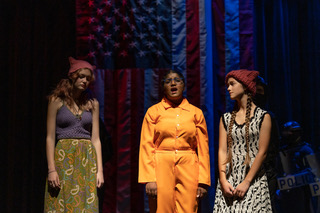Fall play reimagines a Greek tragedy through the lens of current events
Theater program creates a modernized version of ‘Burial at Thebes’ to kick off the year of performances.

Audrey Rasmuss (10), Miriam Mathan (10), and Corinne Iacobucci (10), characters from the fall play, “Burial at Thebes,” depict the emotional turmoil that results when elected officials fail to protect their constituents.
November 7, 2022
On Thursday, Oct. 20, a group of dedicated performers opened our school’s rendition of “Burial at Thebes,” kicking off the fall season of performances. However, the show was presented with a compelling twist: a focus on current political issues within our country. Seamus Heaney’s original rendition of “Burial at Thebes” could not seem further from a story of current politics, yet Director Shawn Riley manages to seamlessly merge the two storylines. This is done through creative set and costume design along with the animated acting of the play’s cast.
“Burial at Thebes” follows the lead, Antigone. Played by Miriam Mathan, as she buries her brother Polyneices, even though the act goes against the explicit orders of her uncle King Creon (representing the president in this adaptation), played by Roan Tierney, and the advice of her sister, Ismene, played by Lizzy Waller.
Antigone’s logic behind the burial stems from a desire to bring justice to her brother by allowing him to rest peacefully after suffering a tragic death. Antigone knows going in, the act of rebellion will likely result in her demise, but she persists. When caught, Antigone is sentenced to death by getting buried alive in a cave.
In our school’s rendition, the play leans into the allegorical meaning behind the story, with Antigone representing those who have had the courage to dissent under an oppressive government, and Creon representing the government itself as the president.
The cast also includes a protester chorus, depicted as pro-choice activists who defend Antigone’s right to demand justice for her brother, and a group of police officers, to represent the mindless followers of Creon’s oppressive regime. The two groups help illustrate the broader meaning of the plot’s conflict.
The cast of talented actors helped to blur the lines between Greek tragedy and governmental corruption, Miriam Matham uses her background in vocal performance to project her lines with confidence to make her act compelling.
Intense emotions such as despair and anger were commonly felt among the characters, allowing the cast to showcase their acting chops. An example can be seen when watching Eurydice, played by Elke Martin, fall to the floor in despair after learning about the death of Antigone. The display of emotion resonated as a viewer, eliciting an empathetic silence from the audience.
The parallel made watching the play a compelling experience. Seeing so much death and violence depicted as a modern event, forced the viewer to recognize the violent injustice that takes place in our everyday lives. Though difficult to watch at times, the depiction was a necessarily bold choice on behalf of Riley.
With the recent overturning of the supreme court case Roe v. Wade, deeming it unconstitutional for the federal government to make abortion legal nationwide, women’s rights to their own bodies have been left to the hands of mainly male politicians. The decision has sparked fear and anger among millions nationwide.
From the perspective of someone living under the often corrupt American government, watching this play and seeing the heightened emotion, mainly anger, depicted by the characters in response to injustice seemed not only justified, but cathartic. When Antigone was yelling at Creon while he intentionally ignored the valid concerns she was proposing, I saw Creon as any person in power who refuses to see the perspectives of those they are supposedly protecting.
The play couldn’t have come at a better time. With midterm elections rapidly approaching, being below the legal voting age can feel frustrating. With our school containing a politically minded student body, as shown through the numerous forms of activism students have engaged in in recent years, not being able to exercise our voices through voting forces us to engage in politics in a different way.
The production of “Burial at Thebes” is a prime example of our students spreading their voice through another avenue, when voting isn’t an option.
























